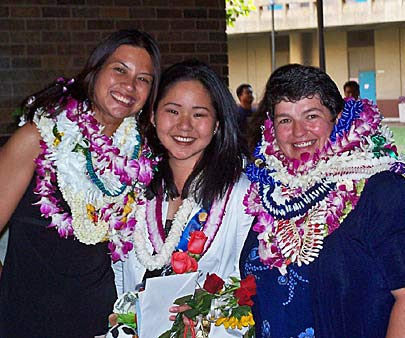Nursing shortage
hits isles at worst time
The aging population requires
more nurses than colleges enroll
Hawaii's rapidly growing shortage of registered nurses is being attacked as a major public health threat.
Hawaii faces an anticipated shortage of 2,267 registered nurses in the next five years and 4,593 by 2020, according to a Hawaii Nursing Shortage Taskforce.
Island residents age 60 and older are expected to increase by nearly 75 percent by 2020 while an 80 percent reduction is predicted in an aging workforce of nurses.
The Hawaii State Center for Nursing, established by the Legislature in 2003, is leading efforts to deal with the shortage with help from health professionals, educators and policymakers statewide.
The importance of nurses for quality care for patients was emphasized during National Nurses Week this month as all states struggle with vacancies left by retiring nurses and faculty.

Dawn Enfield, Kristen Nakamura and Connie Maupin graduated from HPU this week.
Connie Maupin, 41, who came here in 2000 from Florida with her 12-year-old son, applied at Kapiolani Community College for the associate degree in nursing program.
"I wasn't hearing from them and somebody told me about Hawaii Pacific University, so I started there in the summer of 2001," she said.
KCC takes 30 nursing students in the fall and 30 in the spring out of nearly 125 qualified applicants each time, said May Kanemoto, who heads the nursing department.
The department has four faculty positions it can't fill because nurses make up to $20,000 more in the workplace, she said.
Maupin, one of about 50 HPU graduates receiving nursing degrees Wednesday, said she considers it "an investment in my future, as if I were buying real estate or stocks.
"I can be a traveling nurse, travel all over the world, and make great money, and not too many people have that opportunity."
Maupin said HPU has nursing students from all over the world. "A lot of them came here because they had a four-year waiting list where they were at."
Carol Winters-Moorhead, dean of nursing at HPU, which has the largest nursing program in Hawaii, said there is a three- to four-year wait to get into some nursing programs. "We get a lot of transfers from UH and from KCC and some other community colleges."
She said enrollment in the bachelor's entry-level programs across the country increased 14.1 percent last fall. Still, more than 32,000 qualified applicants were turned away from undergraduate and graduate programs nationally, she said.
The average age of Hawaii's practicing nurses increased from 44.92 years in 1997 to 48.7 years in 2001, said Barbara Mathews, interim executive director of the Hawaii State Center for Nursing at UH-Manoa.
"Faculty is aging as well," averaging in the mid-50s, she said.
Limited by faculty positions, UH nursing programs turned away 243 qualified students in 2003, she said.
The Legislature created the center to assure that Hawaii "has the nursing resources necessary to meet the health care needs of its people."
To fund it, lawmakers added a $40 fee to every RN license.
Mathews, formerly vice president for patient care and chief nursing officer at The Queen's Medical Center, said the center will work with concerned parties to collect data to forecast workforce trends, conduct research on the best practices and quality outcomes, develop strategies to recruit and retain nurses and do research and report data on retention of nurses. "Hawaii's Health in the Balance: A Report on the State of the Nursing Workforce" laid out the problems last October, saying, "A shortage of RNs must be viewed through the lens of patient care."
Written by Charissa Raynor, an RN and consultant with the task force, the report noted that increasing registered nurse vacancies could undermine access to care and quality of care.
"The consequences for public health and safety will be significant," she said.
The Hawaii Nursing Shortage Taskforce is continuing work as part of the state Center for Nursing.
"Our concern was that we had all of these qualified potential nursing students turned away by the university over the last couple years because there was not enough faculty," said Richard Meiers, president and chief executive officer, Healthcare Association of Hawaii, adding that the task force worked hard with the Legislature this year to address the issues.
The Legislature established a scholarship program to encourage nurses with bachelor's degrees to enter UH graduate programs and become nursing educators.
Five new faculty positions also were allocated for the UH nursing school, which ultimately would allow 50 more students to be enrolled annually, said Lois Magnussen, interim associate dean, UH-Manoa School of Nursing & Dental Hygiene.
She said the college has 189 applications for the fall semester and is hoping to take 50, assuming some of the positions come through. "Normally, we take 40."
UH-Manoa had 40 nursing graduates last Sunday, she said.
"I think the majority will stay here but I had word that some were recruited by mainland agencies who paid their way over spring vacation. They gave them a free trip to wherever, trying to recruit them."
"You wouldn't believe the recruiting efforts," Winters-Moorhead said, describing offers to students to pay for transportation, living accommodations, licensing exams, bonuses and other enticements.
Maupin, outgoing president of the Student Nurses Association, said: "Nursing is very difficult ... but it is well worth it now that we're here at the end of our stage of celebration."
She said her son, Mason, "is so proud and excited" because, "I'm done and can spend more time with him. It was truly a commitment, financially and of personal time."
E-mail to City Desk
[News] [Business] [Features] [Sports] [Editorial] [Do It Electric!]
[Classified Ads] [Search] [Subscribe] [Info] [Letter to Editor]
[Feedback]
